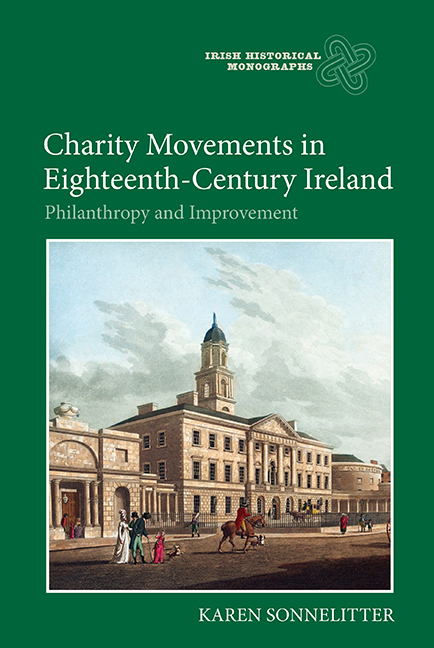Book contents
- Frontmatter
- Dedication
- Contents
- List of Figures
- Acknowledgements
- Abbreviations
- Introduction: Ireland in the Eighteenth Century: The Case for Improvement
- 1 ‘The Worst in Christendom’: The Church of Ireland and Improvement
- 2 Education and Charity: The Incorporated Society for Promoting English Protestant Schools in Ireland
- 3 To Cure and Relieve: Voluntary Hospitals in Eighteenth-Century Dublin
- 4 Improvement as Philanthropy: The Royal Dublin Society
- 5 ‘The Benevolent Sympathies of the Female Heart’: Women, Improvement, and the Work of Lady Arbella Denny
- 6 National and Local Government and Improvement
- Conclusion: Philanthropy and Improvement in Eighteenth-Century Ireland and Beyond
- Bibliography
- Index
2 - Education and Charity: The Incorporated Society for Promoting English Protestant Schools in Ireland
Published online by Cambridge University Press: 11 May 2021
- Frontmatter
- Dedication
- Contents
- List of Figures
- Acknowledgements
- Abbreviations
- Introduction: Ireland in the Eighteenth Century: The Case for Improvement
- 1 ‘The Worst in Christendom’: The Church of Ireland and Improvement
- 2 Education and Charity: The Incorporated Society for Promoting English Protestant Schools in Ireland
- 3 To Cure and Relieve: Voluntary Hospitals in Eighteenth-Century Dublin
- 4 Improvement as Philanthropy: The Royal Dublin Society
- 5 ‘The Benevolent Sympathies of the Female Heart’: Women, Improvement, and the Work of Lady Arbella Denny
- 6 National and Local Government and Improvement
- Conclusion: Philanthropy and Improvement in Eighteenth-Century Ireland and Beyond
- Bibliography
- Index
Summary
The Incorporated Society for Promoting English Protestant Schools in Ireland, more commonly known as the charter schools, has often been criticized by scholars. All agree that the project was a tremendous failure, although interpretations of this failure differ. Michael Ahern called the charter school movement ‘one of the most iniquitous and disgraceful experiments in Irish education’. R. B. McDowell described the Society as ‘ill-managed by committees of languid, educationally inexpert amateurs, and its schools, staffed by incompetent and unscrupulous teachers’. W. E. H. Lecky accused it of using ‘the guise of the most seductive of all charities, to rob [Catholic] children of the birth right of their faith’. Lecky attributed the failure of the Society's proselytizing initiative to the intense resentment it inspired among Catholics. On the other hand, J. A. Froude described the schools as ‘the best conceived educational institutions which existed in the world’. He attributed their failure primarily to mismanagement. According to Froude, charter schools had the potential to be a great gift to the impoverished people of Ireland. Instead, the schools were neglected and failed owing to the incompetence of the Incorporated Society and its members. Although they were contemporaries, it is not surprising that Lecky and Froude took different approaches to the Incorporated Society. Lecky's A history of Ireland in the eighteenth century was a direct reaction to Froude's The English in Ireland in the eighteenth century; Lecky was generally sympathetic to Irish Catholics, while Froude was an imperialist who regarded it as England's moral duty to rule the Irish.
The foundation of all these accusations is well documented in the historical record. The Incorporated Society failed to permanently convert large numbers of Catholic children to the established Church. Furthermore, in the late eighteenth and early nineteenth centuries the Society was plagued with numerous reports of extremely poor conditions in the schools. This chapter does not dispute the idea that the charter schools failed to live up to the high expectations they initially inspired. Most historical interpretations take for granted a sentiment articulated by Ahern: ‘the primary aim of the Charter schools was political, not philanthropic’.
- Type
- Chapter
- Information
- Charity Movements in Eighteenth-Century IrelandPhilanthropy and Improvement, pp. 47 - 75Publisher: Boydell & BrewerPrint publication year: 2016

